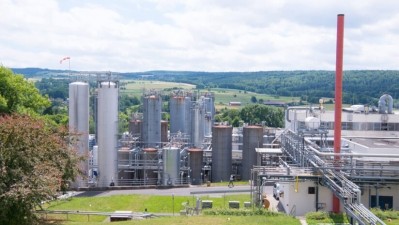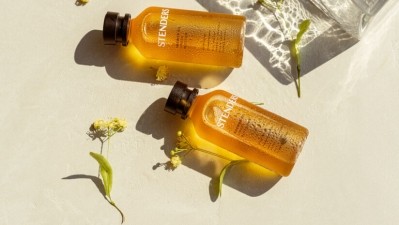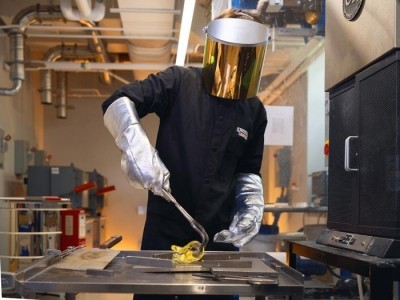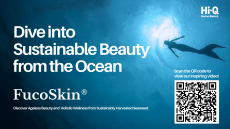6 cosmetics brands making big waves in sustainability

Wild
Body care brand Wild was founded in 2019 by childhood friends Freddy Ward and Charlie Bowes-Lyon with a mission to address the issue of single-use plastic in personal care products.
According to Eli Miansarow, who is brand & partnerships lead at Wild, the brand offers natural, refillable alternatives to traditional personal care products, with a primary focus on deodorants and body wash. ”We target individuals who are seeking effective, natural, and eco-conscious alternatives to conventional personal care products,” she explained.
"Our wider mission is to remove single-use plastic from bathrooms, envisioning a future where retailers embrace refillable options to make a real difference in reducing single-use plastic."
Soeder
Swiss startup Soeder was created by Hanna and Johan Olzon Åkerström and follows a fully circular business model.
The all-natural brand that says it aims to “bring a completely sustainable approach to high quality soap and personal care products.”
Its overarching purpose is to democratise personal care products that take a natural and circular approach, so younger people are able to regularly use these products. In turn, the brand also hopes to make the industry more circular in its approach.
“Sustainability is top priority in all our business decisions. We strive to make everything – from manufacturing processes and purchasing models, to supply chains – as planet-safe as possible,” explained the founders.
“Our soaps are based on the ancient recipe of True Soap, which dates back 5,000 years, and offers natural cleansing and nourishment for the skin without relying on preservatives or chemicals," said Hanna.
“Most modern soaps are detergents, therefore synthetic versions of soap. They often contain sulphates, parabens, and other chemicals which can potentially irritate the skin or harm the environment," she continued.
"We have proven that it’s possible to eliminate any such element, and that this is a business model that can also be very successful. We want everyone to have access to planet-safe options for products they need and use on a regular basis.”
In just six months, the business managed to go from producing 200 products a day to one million in a year and its mission is “to cleanse the industry from unethical practices and reshape consumer perceptions of daily care products.”
Weleda
Although the company is still light years ahead of many of its peers when it comes to circularity, UK MD Jayn Sterland, UK MD told CosmeticsDesign-Europe that it is still "an imperfect system."
"We do use lots of glass and that takes a lot of energy to recycle, but at least there is a good global system for recycling glass. We use some composite recycled plastics. So, for example, we use lots of tubes that come from the recycling of milk cartons and so on," she explained.
"So, we know that it's imperfect, but we're trying to be the best we can be. And the big step change for us will be to find completely compostable materials. So, for example, with glass, you can pretty much recycle glass on a continuous basis and use cardboard and a lot more paper that again can be recycled, but trying to get to that the Holy Grail really which is having packaging that does no harm; that has no waste, everything becomes circular," she continued.
"Wouldn't it be amazing if we could create packaging that then can become food for the soil and 100% compostable? That has to be the ultimate aim."
Recently, the brand has also moved its our Skin Food range and new facial skin care ranges that it has launched this year across Europe back into 100%-recycled aluminium tubes.
"The ultimate aim and the 2030 vision has to be to find this compostable material that will still preserve our products and the actives in the products – so that we when we use the products are still getting the benefit – without having packaging that is causing damage to the planet," she said.
Lush
UK-based Lush has always been eco-conscious across every aspect of its business. It recently shared that it “has a dedicated team focussed on sourcing materials in ways that benefit people, animals and the planet.”
Preserving biodiversity is one issue it attempts to tackle. Earlier this year the brand highlighted how it purchases brazil nut oil from Candela Peru – an organisation that actively protects the Peruvian forest and its wildlife.
Lush also has its own sourcing hub there too and conducts operations in two Peruvian forest concessions in Madre de Dios and Ucayali. Gaining the sourcing rights from here have enabled the brand to collaborate with the local communities to “safeguard the forests and their rich biodiversity,” according to Lush.
In the Madre de Dios concession, Brazil nuts are harvested in partnership with the Castañeros peoples who hand-harvest nuts from the forest floor and then move to the middle of the Amazon Forest during harvest time where they build camps and search vast areas of jungle for Brazil nuts. Lush said the harvest is “carried out sustainably while respecting the ecosystem.”
The nuts are then cold-processed locally in a solar-powered factory and turned into Lush’s vitamin-E rich Brazil nut oil used for use in products such as its Candy Rain conditioner and Ro’s Argan body conditioner.
Beauty Kitchen
The UK-based natural beauty brand Beauty Kitchen recently launched its ‘beauty-from-within’ collection Pure Source Collagen Collection, which included Pure Source Collagen Serum and Pure Source Collagen Gummies. Both are formulated with a pure and potent blend of four sustainably sourced microalgae – known as SPi4™ Complex – which is encapsulated in olive and cranberry seed oil.
The microalgae is sustainably sourced, cultivated in bio tanks that replicate the ocean’s natural environment, rather than being taken from the sea itself.
Beauty Kitchen’s founder Jo Chidley said she believes microalgae has huge potential for the future of cosmetics formulations.
“We want to highlight the power of microalgae for beauty,” she said. “We've got four microalgae in this product and these cover about 20 different things: from protecting you from pollution, through to collagen synthesis and production.”
“And the best part is that we don't need to take the microalgae from their natural ocean space, we can grow it in big greenhouses,” she continued.
“Microalgae just needs water, carbon dioxide and sunlight. And, 50% of all oxygen that's created on the planet is created through microalgae. So, if we are then growing more microalgae, then we will also create oxygen.”
To create the products, Chidley worked with microalgae ingredients specialist Natura Tec, and said that the results from clinical trials of the ingredients “would blow your mind.”
Clarins
Although it hasn’t always been an entirely eco-friendly brand, the heritage skin care and cosmetics business Clarins is making giant steps in terms of turning around its business.
Earlier this year it purchased a 115-hectare green space in the south of France where it plans to cultivate many of the plants used in its product formulations using regenerative agriculture – with the aim of growing one-third of raw ingredients itself by 2030.
According to Clarins, the project will “regenerate and improve the ecological areas on the site”, which it said will “couple biodiversity with the highest quality production.” It also revealed that it plans to use “innovative farming practices and a unique hydrological approach.”
It is the second domaine that the company has purchased in France, which will help the business gain more traceability in its supply chain. In 2016, it had bought Le Domaine de Serraval in Haute-Savoie, which now annually supplies 2.5 tons of plants for Clarins’ laboratories and factories.
In January, Clarins was also part of a consortium of 15 different cosmetics companies that formed the TRASCE alliance, to help enhance traceability in major ingredient and packaging supply chains across the global beauty and personal care industry.

































